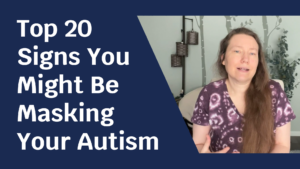Disclaimer: these are just a few of my thoughts at this time. Others will feel differently.
The challenge of speaking for another
If you want to raise up the voices of the autism community, that’s great! Be our ally!
You’re probably already advocating for your child’s needs, educating those around you, and I thank you for that.
I hope that our allies will always listen to our voices and try to understand our experiences.
Our situation is similar to trying to speak about any culture you aren’t a part of. For example, I have several Indigenous American friends and have spent some time with the Oglala Lakota Tribe in South Dakota, but I did not grow up there, and though I highly respect them, and feel that I can articulate some of their viewpoints, I can’t truly speak from their point of view. I am an outsider looking in and I don’t look at the world through their eyes.
Our situation is similar to trying to speak about any culture you aren’t a part of.
But my goal is not to become one of them, nor to adopt their culture, nor be absorbed into their world. That would dishonor my own culture and myself. My goal is to listen with openness and humility, trying to understand as much as I can, and then to look with new eyes to see them again for the first time, over and over.
I hope that our allies will honor us in the same way. Not by trying to speak for us, but by raising up our voices and helping distribute our stories, spreading autism acceptance to others.
Ways to help
You can do this by reading our blogs and our books, and sending them to your friends when they ask about autism. There are a bunch of good ones on my resources page here.
You can do with strangers in public places when they ask or comment about your child’s challenging public behaviors, by describing briefly, but accurately, what your child is going through, instead of just apologizing and leaving, leaving them to stew in their own judgmental thoughts.
You can do this by talking to us whenever you get a chance, and asking us questions when we seem open to them.
You can do this by hiring autistic individuals, and advocating to management that promotions and rewards not be overlooked simply because we may have different social skills, if we are qualified to do the work.
When in a mixed group, let the autistic people answer the questions on autism, and encourage others to take them at their word.
How else can you do this?
I will keep doing this until we gain mainstream social acceptance.





